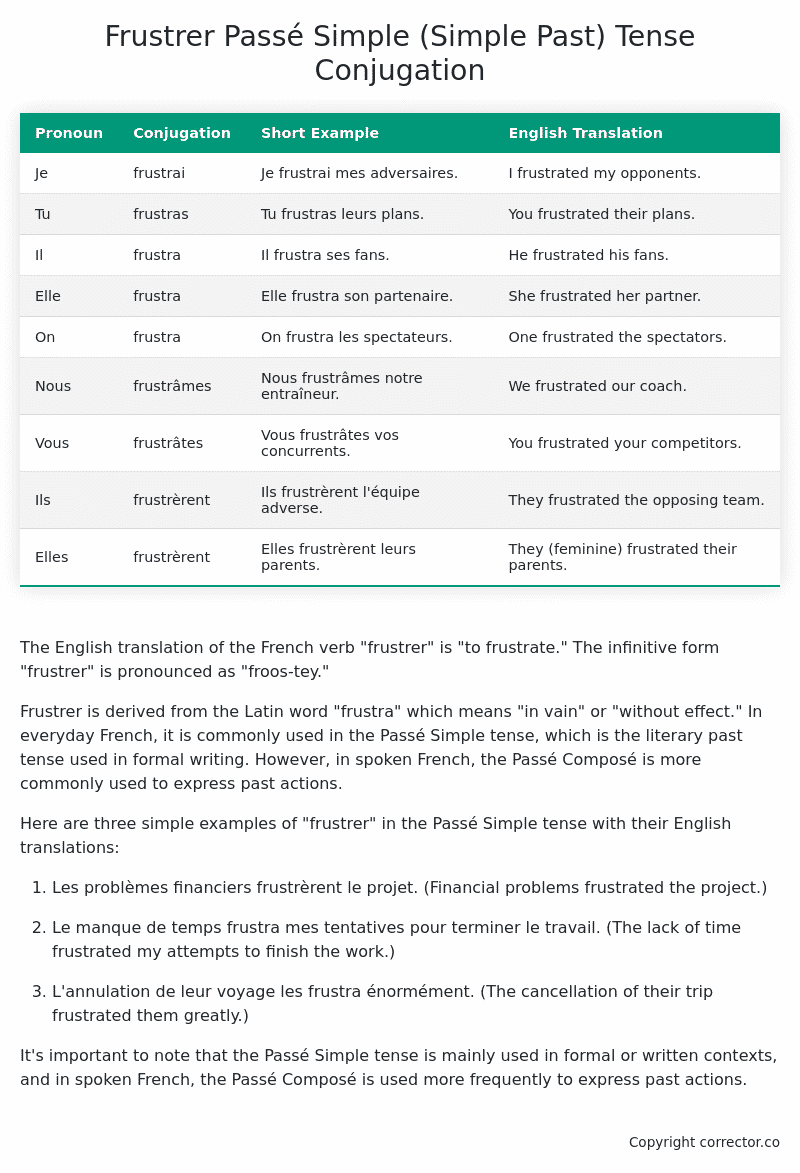Passé Simple (Simple Past) Tense Conjugation of the French Verb frustrer
Introduction to the verb frustrer
The English translation of the French verb “frustrer” is “to frustrate.” The infinitive form “frustrer” is pronounced as “froos-tey.”
Frustrer is derived from the Latin word “frustra” which means “in vain” or “without effect.” In everyday French, it is commonly used in the Passé Simple tense, which is the literary past tense used in formal writing. However, in spoken French, the Passé Composé is more commonly used to express past actions.
Here are three simple examples of “frustrer” in the Passé Simple tense with their English translations:
-
Les problèmes financiers frustrèrent le projet.
(Financial problems frustrated the project.) -
Le manque de temps frustra mes tentatives pour terminer le travail.
(The lack of time frustrated my attempts to finish the work.) -
L’annulation de leur voyage les frustra énormément.
(The cancellation of their trip frustrated them greatly.)
It’s important to note that the Passé Simple tense is mainly used in formal or written contexts, and in spoken French, the Passé Composé is used more frequently to express past actions.
Table of the Passé Simple (Simple Past) Tense Conjugation of frustrer
| Pronoun | Conjugation | Short Example | English Translation |
|---|---|---|---|
| Je | frustrai | Je frustrai mes adversaires. | I frustrated my opponents. |
| Tu | frustras | Tu frustras leurs plans. | You frustrated their plans. |
| Il | frustra | Il frustra ses fans. | He frustrated his fans. |
| Elle | frustra | Elle frustra son partenaire. | She frustrated her partner. |
| On | frustra | On frustra les spectateurs. | One frustrated the spectators. |
| Nous | frustrâmes | Nous frustrâmes notre entraîneur. | We frustrated our coach. |
| Vous | frustrâtes | Vous frustrâtes vos concurrents. | You frustrated your competitors. |
| Ils | frustrèrent | Ils frustrèrent l’équipe adverse. | They frustrated the opposing team. |
| Elles | frustrèrent | Elles frustrèrent leurs parents. | They (feminine) frustrated their parents. |
Other Conjugations for Frustrer.
Le Present (Present Tense) Conjugation of the French Verb frustrer
Imparfait (Imperfect) Tense Conjugation of the French Verb frustrer
Passé Simple (Simple Past) Tense Conjugation of the French Verb frustrer (You’re reading it right now!)
Passé Composé (Present Perfect) Tense Conjugation of the French Verb frustrer
Futur Simple (Simple Future) Tense Conjugation of the French Verb frustrer
Futur Proche (Near Future) Tense Conjugation of the French Verb frustrer
Plus-que-parfait (Pluperfect) Tense Conjugation of the French Verb frustrer
Passé Antérieur (Past Anterior) Tense Conjugation of the French Verb frustrer
Futur Antérieur (Future Anterior) Tense Conjugation of the French Verb frustrer
Subjonctif Présent (Subjunctive Present) Tense Conjugation of the French Verb frustrer
Subjonctif Passé (Subjunctive Past) Tense Conjugation of the French Verb frustrer
Subjonctif Imparfait (Subjunctive Imperfect) Tense Conjugation of the French Verb frustrer
Subjonctif Plus-que-parfait (Subjunctive Pluperfect) Tense Conjugation of the French Verb frustrer
Conditionnel Présent (Conditional Present) Tense Conjugation of the French Verb frustrer
Conditionnel Passé (Conditional Past) Tense Conjugation of the French Verb frustrer
Conditionnel Passé II (Conditional Past II) Tense Conjugation of the French Verb frustrer
L’impératif Présent (Imperative Present) Tense Conjugation of the French Verb frustrer
L’impératif Passé (Imperative Past) Tense Conjugation of the French Verb frustrer
L’infinitif Présent (Infinitive Present) Tense Conjugation of the French Verb frustrer
L’infinitif Passé (Infinitive Past) Tense Conjugation of the French Verb frustrer
Le Participe Présent (Present Participle) Tense Conjugation of the French Verb frustrer
Le Participe Passé (Past Participle) Tense Conjugation of the French Verb frustrer
Struggling with French verbs or the language in general? Why not use our free French Grammar Checker – no registration required!
Get a FREE Download Study Sheet of this Conjugation 🔥
Simply right click the image below, click “save image” and get your free reference for the frustrer Passé Simple tense conjugation!

Frustrer – About the French Passé Simple (Simple Past) Tense
Formation
Usage
Narration
Historical Context
Interactions with other tenses
Passé Composé
Imparfait
Conditional and Subjunctive
Summary
I hope you enjoyed this article on the verb frustrer. Still in a learning mood? Check out another TOTALLY random French verb conjugation!


